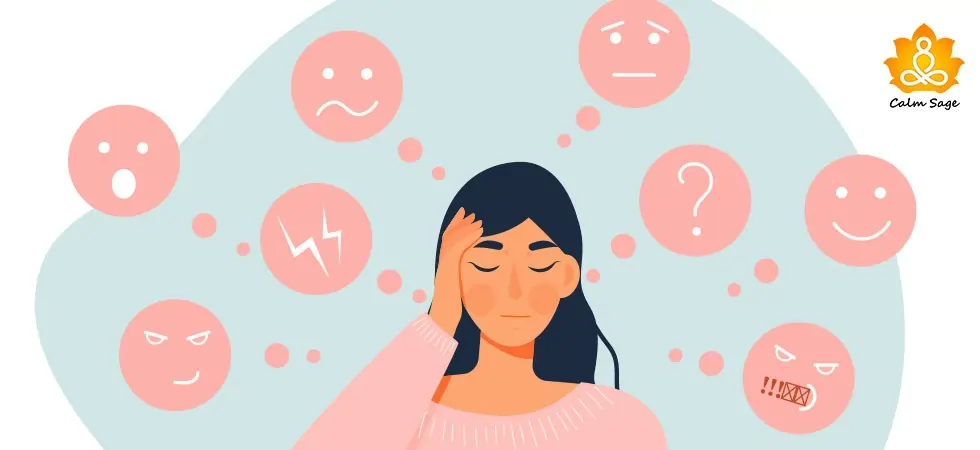Is Overthinking Disorder Real? How to Stop The Cycle of Overthinking?

When making decisions about something we all think about everything involved – the impact, consequences, and all – but some people go one step further and turn the thought over in their minds until it’s the only thing they think about. This Can be overthinking disorder. The vicious cycle of overthinking can sometimes be in our favor but other times it’s an indication of an underlying problem.
It’s OK to turn over thoughts in your head sometimes, with emphasis on sometimes, but when you’re an overthinker, every thought you think can overshadow your actions. It disrupts your sleep, work, relationships, and other aspects of your life.
Overthinking is a common mental health condition that negatively affects your well-being as it causes feelings of anxiety, depression, stress, and more. Overthinking also triggers physical health issues such as headaches. Not only that but it can also affect your ability to make decisions, enjoy the present moment, and focus on what’s important.
But, can overthinking be a mental disorder in itself?
In this blog, we’re exploring if overthinking can be a mental disorder, its signs, and causes, and how you can stop the cycle of overthinking.
Is Overthinking a Disorder?
Well, overthinking is not officially recognized as a mental health disorder or illness, but it’s one of the major recognized symptoms of Generalized anxiety disorder (GAD), depression, obsessive-compulsive disorder (OCD), and post-traumatic stress disorder (PTSD).
Overthinking is a condition that’s characterized by the tendency to excessively worry about things that are non-significant even. If you have overthinking as a major symptom of the listed disorders, then you may experience;
- Worrying excessively about everything for at least six months
- Difficulty controlling your thoughts, causing an inability to function
- Restlessness
- Difficulty concentrating
- Sleep troubles
What Does it Look Like?
If you’re an overthinker, then you may experience these signs;
- Jumping from one thought to another as you excessively worry about it
- Thinking about the worst-case scenario first
- Not being able to make a decision and second-guess everything
- Constantly feeling on edge
- Seeking constant reassurance from others
Overthinking can also start a domino effect where you start worrying about one thing but then that starts a worrying chain, and you begin worrying about something else entirely unrelated to the previous thought. This cycle continues until your thoughts overshadow every action you take.
Why do we Overthink?
We overthink because it’s a way of controlling a situation and wanting to feel more confident in what we’re going to do next. When you overthink, you switch into an analysis mode where you imagine every scenario and attempt to predict what will happen so you can reduce your stress and anxiety.
However, overthinking is also the one thing that can prevent you from taking action because you can’t seem to switch off the analysis part of your brain.
All of us – regardless of age, gender, and personality – struggle with ruminating thoughts but people who’re more involved or motivated by accomplishments or success are more likely to overthink.
Ever seen a perfectionist or an overachiever? Well, they are likely to overthink because they fear failure and the need to be perfect in everything they do takes over their life which often leads to them criticizing decisions and mistakes.
Dealing With Overthinking Disorder can be Overwhelming
How to Stop the Cycle of Overthinking?
Here are five simple yet effective ways to stop the cycle of overthinking;
1. Identify The Triggers
You can try some insightful mindfulness techniques to figure out what triggers your overthinking. You can start by writing in a journal about little things or situations that cause you to switch into overthinking mode. With time, you’ll begin to notice a pattern and identify the triggers. This way, you’ll be able to stop overthinking even before it begins.
2. Question Your Thoughts
You may not believe it but questioning your thoughts can go a long way in stopping your overthinking. Look at what’s in front of you and challenge your worries by looking at the evidence. See if the thought you’re having is logical, reasonable, or even helpful. If they aren’t any of the above, then challenging them and letting go of them becomes easier.
3. Seek Help From Others
When a loved one tells you that you’re overthinking much, then maybe it’s time you listen to them. Get their perspective about a thought that’s bugging you. Seek their opinion and ask them to give you advice on the thought. Choose a person who knows how to manage excessive worries. Talking to a trusted person can help you stop overthinking.
4. Get Some Exercise
Research suggests that exercising regularly can help reduce depression and anxiety, and even stop overthinking. When you feel yourself spiraling into overthinking, take a 5-minute break and walk around. This will give your brain a boost of endorphins and even shift your nervous system’s stress response, reducing trauma-related rumination.
5. Seek Professional Support
When overthinking begins to take over every little aspect of your life, more than you like, then it’s a sign that you need to seek professional help and support. If you leave overthinking untreated or unchecked, it could have serious consequences on your overall well-being and even lead to physical symptoms such as;
- Headaches
- Migraines
- Excessive fatigue
- Nausea or diarrhea
- Sleep issues, and more
Final Thoughts…
The overthinking disorder might not be real but it’s a thing we all struggle with from time to time. Overthinking is a thought pattern where your thoughts and worries are caught in a cycle of rumination.
Instead of helping you move on, overthinking prevents you from taking action because you fear failure. When overthinking begins to take over your life, then it could be an indication that you’re struggling with a serious issue such as depression or anxiety disorder.
The steps I’ve mentioned in this blog can help you stop overthinking. If that does not help, you can try consulting a professional counselor.
I hope this blog helped you understand what’s overthinking disorder, the effects of overthinking on your body and life, and how you can stop overthinking.
For more, you can write to us at info@calmsage.com or DM us on social media. You can also share your thoughts and tips in the comments section below.
Take Care!
Next Read:
25 + Affirmations For Perfectionists To Stop Overthinking
Guided Meditation For Overthinking: 7 Tips For Meditating When You’re An Overthinker
Is Overthinking Making You Second Guess Yourself A Lot lately? How To Stop





















Yes, Overthinking Disorder is a real issue. To stop the cycle, practice mindfulness, challenge negative thoughts, set boundaries, and seek professional help if needed. Take control of your mind!